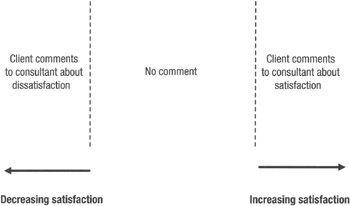MONITORING THE CLIENT RELATIONSHIP
Remember clients will always have a view of the consultant, but whether they tell the consultant of their view is another matter. This is illustrated in Figure 9.7.

Figure 9.7: The client's comments
Note that there is on both sides a threshold of dissatisfaction or satisfaction that must be reached before the client will comment. The consultant's aim must be continuing positive satisfaction, rather than simply assuming that no feedback means that the client is satisfied. There are two things that the consultant must do to address this: 1) monitor the quality of the client relationship by actively soliciting feedback and 2) adopt good practices in operating consultancy projects, so that the risk of client dissatisfaction is reduced.
Regular progress reviews enable the client to feed back concerns, and can be used to manage expectations. Even so, there is a danger that the consultant does not hear what the client is saying; you have to listen carefully to hear softly voiced criticisms.
Handling Complaints
Inevitably from time to time a client may complain about progress or the way a job is being run, or the impact of it on client staff. Do not overreact to complaints - they might not be justified or could be totally unfounded. Indeed, a complaint is valuable, as it means that the client cares enough to tell you. A complaint enables you to put things right, or to improve service. If the client does not tell you, you cannot put things right.
Here is an effective way of handling a complaint from a client:
-
Thank them for bringing it to your notice and giving you a chance to put it right. (Far better this way than that they should simply get annoyed, leaving the matter unresolved.) Tell them you're sorry they have been upset, but don't apologize for having done something wrong. (You don't even know if it's your fault at this stage, but you can regret their being upset.)
-
Encourage them to give you the full story and note the details. Don't interrupt while the client is giving vent to their feelings and don't argue, however justified you think you may be in doing so - this will only make them more irritated.
-
When you have all the information, check whether the complaint is founded. Sometimes difficulties arise from misunderstandings and a simple explanation will sort things out. If you cannot deal with the complaint at this meeting, however, explain this and tell the client what you plan to do. In particular, agree when you will get back to them with a response and make sure you do follow up.
A critical test of any provider of goods or services is how they handle complaints. If a complaint is handled professionally and well, it can strengthen rather than weaken the client relationship. There are sound reasons for this. Complaints usually arise because a client has a problem and when you work with a client to resolve a complaint you are, in effect, engaged in joint problem solving. Joint problem solving strengthens relationships; indeed, it is a mechanism often used in team building programmes. So, a capably resolved complaint can strengthen the relationship.
It is important to know when to call for help when dealing with a complaint. This is particularly necessary when a complaint is about you (when you are not in the best position to resolve it) or if the client is seeking some commercial compensation. Sometimes things do go wrong (no consultant is perfect!) but do not compound the mistake by not asking for help when you need it.
EAN: 2147483647
Pages: 89
- Structures, Processes and Relational Mechanisms for IT Governance
- A View on Knowledge Management: Utilizing a Balanced Scorecard Methodology for Analyzing Knowledge Metrics
- Measuring ROI in E-Commerce Applications: Analysis to Action
- Governing Information Technology Through COBIT
- Governance in IT Outsourcing Partnerships